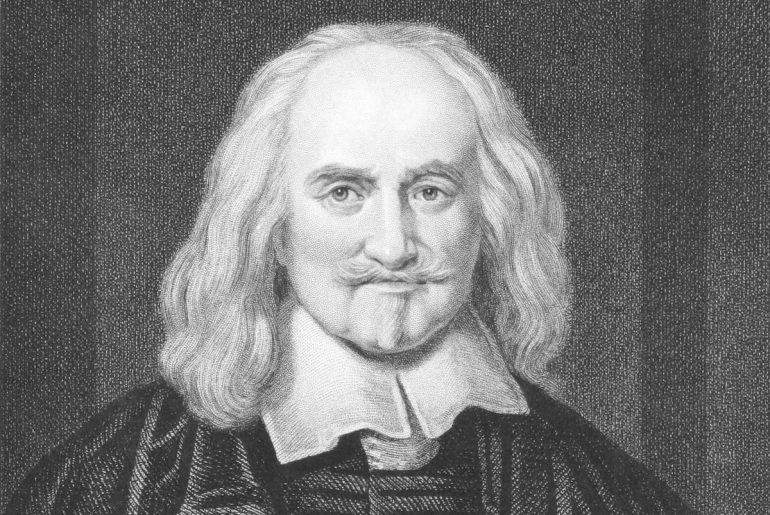Thomas Hobbes (5 April 1588 in Westport, Wiltshire – † 4 December 1679 in Hardwick Hall, Derbyshire) was an English mathematician, political theorist and philosopher. His most famous work is Leviathan. In Leviathan, Hobbes develops his theory of society, according to which suffering and injustice prevail because humanity is in a social state of nature. In order to overcome this state of nature, he saw only one possibility, namely to create an absolutist state.
Who was thomas hobbes?
Thomas Hobbes was born on April 5, 1588 as the son of a country parson. He was already able to do arithmetic, write and read at the age of four, which earned him a reputation as a child prodigy. During his studies, which he began at the age of 14, he devoted himself mainly to physics and logic. He then took a job as a private tutor for the aristocratic Cavendish family, which he held until his death.
The wealth and support of the family helped him to travel extensively. On his travels he met some important philosophers, for example René Descartes or Galileo Galilei. At times he also worked as Francis Bacon’s secretary.
Hobbes lived in turbulent times and experienced, among other things, the civil war of 1642. The power struggles and disputes that preceded it naturally also influenced his social philosophy. He was a representative of absolutism, which his main work “Leviathan” impressively proves. In the heated social climate of the era, his theories were often rejected and he was hated by parts of society.
Though he had more enemies than friends, he was able to live out his twilight years in safety and seclusion at a Cavendish family estate, until his death on December 4, 1679.
Thomas Hobbes philosophy compact
Probably Hobbes’ best-known achievement was the development of the social contract, which he established in his work Leviathan. He saw more of the bad than the good in people and, in addition to absolutism, represented a pronounced skepticism.
State philosophy
Although Thomas Hobbes also devoted himself to political philosophy in De Cive, Fundamentals of Natural and Political Law and the third part of Elements of Philosophy, Leviathan is considered his main work in this area. Like John Locke, Hobbes assumed a human state of nature, but interpreted it in a completely different way.
For Locke, the state of nature is reached when all people obey natural laws and natural law prevails. In this state, peace reigns and everyone has the inviolable right to life, health, liberty, and property. State separation of powers should lead to this state being able to be achieved. The people themselves decide who runs the state.
Thomas Hobbes, on the other hand, almost exclusively saw the bad in people. Humans are inherently selfish, glory-seeking, and ruled by feelings of fear and greed. For him, the supreme goal of man was the preservation of the species and the pursuit of personal gain. So he coined the well-known sentence:
Homo Homini Lupus (Man is a wolf to man)
For him, living out the state of nature was something that had to be overcome so that peaceful coexistence could be made possible. In order to achieve this, a social contract should be adopted. The idea of the social contract itself is very similar to Locke’s. Hobbes’ position is as different from Locke’s in terms of implementation as it is in his definition of the state of nature.
Hobbes was strictly against the separation of powers and in favor of absolutism. People could only live collectively in peace if they handed over the responsibility for their lives to an absolutist ruler. It would be the task of this ruler to ensure that people do not revert to the state of nature. He should protect people and take care of safety, health and property.
Freedom in the sense of freedom of belief or conscience should also be delegated to the state, since individual freedom was the basis of the state of nature. Only one religion should be allowed. The state should determine what that is. Locke called superstitions that were not permitted by the state.
Epistemology
Hobbes was a strict advocate of determinism. All human actions, experiences, thoughts, experiences etc. were predetermined for him, free will did not exist for him. He developed a mechanistic epistemology which states that all sensory impressions can be traced back to external influences. A pressure or stimulus is perceived from the outside, in that the stimulus sets the body in motion.
For him, this applied not only to direct external stimuli, but also to the perceptual processes of consciousness. Here he represented a skepticism that denied that real knowledge about the outside world was possible. For him, sensory perceptions were imaginations that are triggered by an external stimulus. According to Hobbes, man cannot recognize the nature of the stimulus, since the perceptions can only relate to the inner-psychic processes. Man does not perceive the objects and their properties, but only “appearances” of it.
Works (excerpt)
1640: The Elements of Law Natural and Political
Elements of philosophy
1654 Of Libertie and Necessitie
1651 Leviathan or The Matter, Forme and Power of a Common Wealth Ecclesiasticall and Civil
1651: (Philosophical Rudiments Concerning Government and Society
1668 (Published posthumously 1681): Behemoth or the Long Parliament (Behemoth: the History of the Causes of the Civil Wars of England and of the Counsels and Artifices by which they were carried on from the year 1640 to the year 1662)
Quotes
“Two things are necessary for citizens to become prosperous: work and thrift.”
(principles of philosophy)
“The conscience of every citizen is his law.”
(Leviathan)
“We find three reasons for strife in human nature: first, competition, second, lack of self-confidence, third, lust for fame.”
(Leviathan)
“Violence and deceit are the two chief virtues in war.”
(Leviathan)
“Now both propositions are true: man is a god for man and man is a wolf for man; that if you compare citizens with each other, that if you compare states with each other. Ergo, man is a god for man if you compare citizens with one another.”
Who is Thomas Hobbes summary?
Thomas Hobbes (April 5, 1588 – December 4, 1679) was an English philosopher whose work Leviathan (1651) greatly influenced the development of Western political philosophy. He is the quintessential theorist of political absolutism.
Who was Thomas Hobbes the contributions and works of him?
In his most famous work, Leviathan, Hobbes marked the move from the natural law doctrine to the social contract theory of law. Among his most important contributions are those that spoke of the forms of government in history, from the ancients to his days in the seventeenth century.
What is Hobbes’s thought?
Hobbes argues that for men to live together without falling into anarchy and war, a strong and authoritarian state is necessary. To achieve this, it is essential to establish a relationship of sovereigns and subjects among men.
What did Hobbes contribute to human rights?
According to Hobbes, man, in a state of nature, is a wolf to man: “Homo homini lupus”. Hobbes only recognizes citizens’ right to security, which the State must guarantee, and the right to disobedience, only exercisable when the State does not guarantee this security to citizens.
What is Hobbes’s most important work?
Thomas Hobbes was an English philosopher, scientist, and historian, best known for his political philosophy, articulated in this book, Leviathan (1651), which is his masterpiece.
What does Hobbes mean by the phrase man is the wolf of man?
“Man is a wolf to man” (in Latin, homo homini lupus) is a phrase used by the 18th-century English philosopher Thomas Hobbes in his work The Leviathan (1651) to refer to the fact that man’s natural state leads him to to one the continuous fight against his neighbor.
How does man reach happiness according to Thomas Hobbes?
But what is happiness for Hobbes? Broadly speaking, it is the never-ending process of wish-fulfillment: “The continual success in obtaining those things which a man desires from time to time, that is, his continual prospering, is what men call happiness.” ” (Hobbes 2003 50).
What characteristics does Hobbes assign to the human being?
For Hobbes, the human being is evil by nature, so that in order to coexist absolute power is needed, an authoritarian law that controls the aggressive impulse that arises from the selfish motivation of all beings.
Why did God create Leviathan?
Some interpreters suggest that the Leviathan is symbolic of humanity as opposed to God, and is no more literal than the beasts mentioned in Daniel and Revelation. In medieval demonology, a Leviathan was an aquatic demon that tries to possess people, making them difficult to exorcise.
Who killed Leviathan?
The word “Leviathan” appears in the following biblical books: On that day, Yahweh will punish Leviathan, the swift serpent, and Leviathan, the crooked serpent, with his hard, great and strong sword; and they will kill the dragon that is in the sea.
What does the word Leviathan mean?
Leviathan is a mythological creature that is referred to in the Holy Bible, especially in the Old Testament. It is, in general terms, a sea creature that represents chaos and evil before the creation of the world. This creature would have been created by God.
How did thomas hobbes influence modern government?
The Founding Fathers were heavily influenced by English philosopher Thomas Hobbes in establishing America’s First Principles, most notably the recognition of unalienable rights, the Social Compact, and limited government.
In what ways does the international system resemble thomas hobbes’s view of the state of nature?
The international system resembles Thomas Hobbe’s view of the state of nature in that “Stronger nations prey upon the weak.” Hobbe’s believed that the state of nature was anarchic and conflict prone whereby the strong would prey upon the weak.
What did thomas hobbes do?
Thomas Hobbes (5/15 April 1588 – 4/14 December 1679) was an English philosopher, considered to be one of the founders of modern political philosophy. Hobbes is best known for his 1651 book Leviathan, in which he expounds an influential formulation of social contract theory.
What country was thomas hobbes from?
Thomas Hobbes, (born April 5, 1588, Westport, Wiltshire, England—died December 4, 1679, Hardwick Hall, Derbyshire), English philosopher, scientist, and historian, best known for his political philosophy, especially as articulated in his masterpiece Leviathan (1651).





